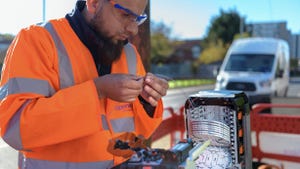Ted Cruz champions fixed wireless for BEAD deployments
The White House's BEAD program currently 'ignores the reality that alternative technologies like fixed wireless' may be better for some consumers, Senator Ted Cruz wrote in a new report.

Sen. Ted Cruz of Texas released a new report Friday that urges regulators to take another look at satellite and fixed wireless technologies as they dole out billions of dollars in government subsidies.
Cruz's report also warns of the "high potential for waste, fraud, and abuse" in the $42.45 billion Broadband Equity Access and Deployment (BEAD) Program.
"The $42 billion Bidenomics broadband boondoggle is the latest example of the federal bureaucracy aimlessly throwing around taxpayers' hard-earned money," Cruz said in a statement to Fox News Digital.
To be clear, the report builds on arguments already outlined by other government agencies and trade associations, and its release is likely timed to affect elections rather than policy. But it's noteworthy in that it may bolster efforts by some in the US wireless industry to funnel more BEAD subsidies to fixed wireless Internet providers, including those operating on unlicensed spectrum.
The details
According to Cruz's new 20-page report, the BEAD program currently "ignores the reality that alternative technologies like fixed wireless and satellite may be better suited to different consumers and geographies."
It points to Tuckernuck Island, Massachusetts, as an example. "The island has no wired service, but it does have access to satellite service with speeds that exceed the thresholds set by Congress for BEAD, according to the FCC's map," says the report. "However, because the Biden administration's BEAD rules summarily exclude certain technologies – namely unlicensed fixed wireless and satellite – from being considered 'reliable broadband service,' the entire island is considered unserved for the purposes of BEAD and eligible to be overbuilt."
The BEAD program currently leaves the door open to funding fixed wireless access (FWA) operations that work in licensed spectrum holdings. That would allow FWA providers like T-Mobile and Verizon to potentially win BEAD money. Indeed, FWA services from Verizon and T-Mobile have captured the lion's share of growth in the US broadband industry in recent months.
But other, smaller FWA providers – those that run services in unlicensed spectrum – may not be eligible for BEAD funding under current rules.
The program also prevents satellite Internet providers like EchoStar and SpaceX's Starlink from receiving BEAD funds.
Cruz's report also warns that BEAD funding is unevenly distributed, and that it may not be aligned with other government funding programs for broadband services in rural areas.
Those are some of the same concerns raised in recent years by the likes of the Government Accountability Office (GAO) and wireless trade associations like the Competitive Carriers Association (CCA), Wireless Infrastructure Association (WIA) and the Wireless Internet Service Providers Association (WISPA).
NTIA, a White House agency, developed its BEAD rules over several years. The agency is now in the process of releasing money to states, which will then award the funds to telecom companies to build networks in rural areas. Already AT&T, T-Mobile, UScellular and Comcast have voiced interest in obtaining BEAD funding.
Broadly, much of the funding will likely go to companies building fiber networks, but it's possible that some fixed wireless operations will also receive funding.
About the Author(s)
You May Also Like












